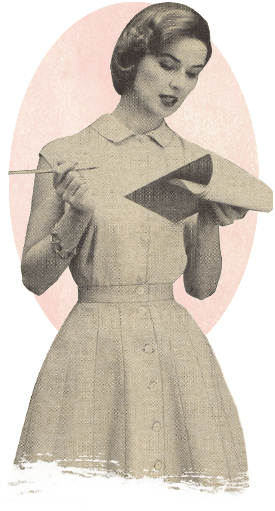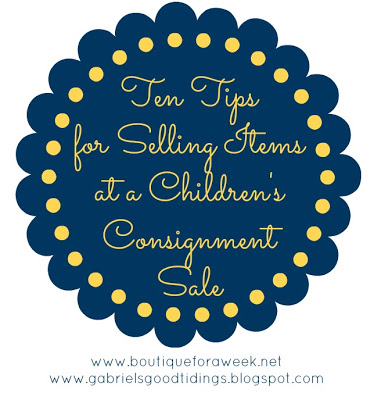Blog

Ten Tips For Selling Items
Today on the blog we welcome back Amy from Gabriel’s Good Tidings to share tips on how to get your items sold.
One of the most common questions I receive about consigning children’s items is “How do you make money selling used items?” Today, I’m sharing my top ten tips for making sure your items will sell!

When you work hard to gather, price and deliver your items, it’s important that they sell. After all that work, you don’t want to return home with greater than half of your gently used children’s items!
1. Price it Right. Look at your item closely. What would you pay for this item at a garage sale? What would you pay new? Based on the answers to these questions, price your item accordingly. A good rule of thumb is to price the item somewhere between 75% off retail price and just above garage sale prices. So if a shirt was $10 new, the consignment price should be around $2.00. I have found that the majority of my items sell for $2 or less. If you need additional pricing help, check here!
2. Volunteer. I’ve elaborated on this topic before, but volunteering gives you a first-hand look at what items buyers love and shopping patterns. You can read 15 articles on consigning, but volunteering will give you the experience that will cement this information into your mind. For more information about volunteering at Boutique For A Week, read here!
3. Get it Clean. Wash clothes, wipe down toys, scrub shoes- get those items clean and in pristine condition! Giving your items a “bath” will make them presentable, desirable, and sell-able!
4. Hang it Up. Boutique For A Week requires clothing to be on hangers. Although a few items such as tights are sold in large bins, I have found that items tend to sell better when hanging. Whenever possible choose to hang, even if you have the option to put something in a Ziploc bag and sell it from a bin.
5. Battery Check. Any toys that require batteries should be checked prior to drop-off. Invest in new batteries if needed, and your toy will be much more likely to sell. Who wants to risk purchasing a toy that may or may not work? Remember at Boutique For A Week, shoppers can request batteries be put in non-working toys to make sure that they work. Consignors are charged $1 per battery against their earnings.
6. Piece Check. Open all puzzles, games, etc and make sure all pieces are included. It’s important for buyers to know that they are purchasing a complete set and won’t find themselves short a puzzle piece with their child. Note that information on your tag!
7. Print Tags in Groups. I choose to print tags in sets of 10. This system works for me because I can tackle a small pile of items in a short amount of time. It also prevents me from having a stack of tags and searching for that one particular shirt… a never-ending matching game that drives me crazy! Printing in small numbers allows me to price, tag and store items without getting overwhelmed. The Boutique For A Week website has a helpful page about preparing your merchandise as well as a blog post specifically about tagging clothes.
8. Tag With Items You Have. If you have a lot of zip ties, use those to secure your tags to your items. If you have a surplus of safety pins, use them! Tagging doesn’t have to be costly- use items you have in your home. I’d recommend Boutique For A Week’s video series on tagging for tips and tricks.
9. Keep it Organized. As you tag items and they’re ready to be sold, organize them to make Drop Off more efficient. Boutique For A Week requires clothing to be sorted by gender and by size before you can place them on the sales floor. Toys and books should be grouped by age. At Drop Off, it’s essential to put your items in the best location to sell (the volunteers are great to help direct you!) because if you put your girl clothes in the boy swimsuit section, they’re not likely to sell there!
10. Designate a Room. If you have an extra room in your home, designate this space as “Consignor Central.” It can be a guest room, formal living or dining room, or home office that is rarely used in your home. For me, I use my sewing room and our formal living room to organize and prepare items to consign. I have a “consigning station” complete with all my tagging supplies and bins to store my “ready to go” items. This helps me stay organized and see the progress I’ve made in getting it all ready for consignment week!
I hope you’re getting excited about the upcoming sale! Will you shop, consign, volunteer - or all three?


